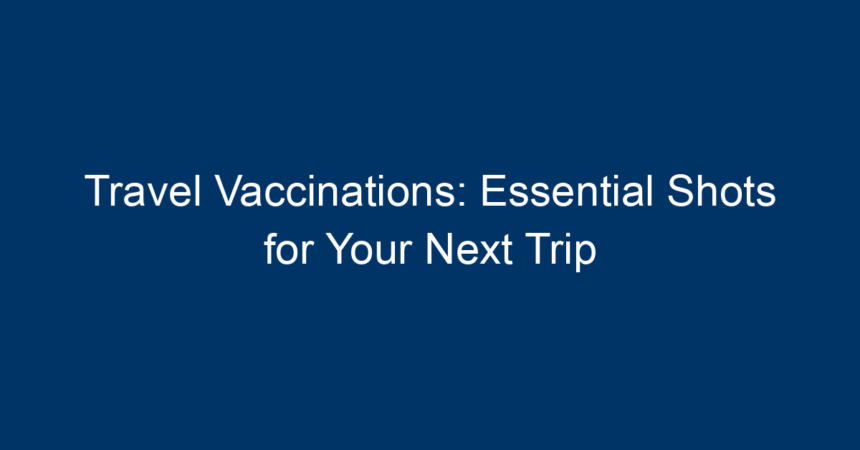When planning your next adventure, whether it’s a quick getaway to a tropical paradise or a cultural exploration of ancient cities, one aspect often overlooked is travel vaccinations. Ensuring your health and safety while abroad is crucial, and getting the right vaccinations can help you avoid diseases that may not be a concern in your home country. In this comprehensive guide, we’ll explore the importance of travel vaccinations, the essential shots you may need, and how to prepare for a healthy trip.
Why Are Travel Vaccinations Important?
Travel vaccinations serve as your first line of defense against various illnesses, especially in regions where specific diseases are prevalent. Certain vaccines protect you from diseases that can be deadly or lead to severe health complications. For instance, diseases like hepatitis A and malaria may be common in tropical areas but rare in developed countries.
- Health Protection: The primary goal of travel vaccinations is to keep you safe from contagious diseases.
- Preventing Outbreaks: Vaccinations not only protect you but also help prevent the spread of diseases to others.
- Travel Regulations: Some countries require proof of vaccination (such as yellow fever) for entry, making timely vaccinations vital for seamless travel.
Essential Vaccinations for Your Trip
While vaccination requirements vary based on your destination, there are several key travel vaccinations that are commonly recommended. Here’s a rundown of essential vaccinations to consider:
1. Hepatitis A and B
Hepatitis A is a viral liver infection that can be contracted through consuming contaminated food or water. It’s essential for travelers visiting regions with poor sanitation.
Hepatitis B, on the other hand, is transmitted through blood, sexual contact, and other bodily fluids. It is particularly important for travelers anticipating close contact with local populations or engaging in high-risk activities.
2. Typhoid Fever
Typhoid fever is another serious illness that can be contracted through contaminated food and water. It’s common in many countries, particularly in South Asia, Africa, and parts of Latin America. Vaccination is highly recommended for those traveling to areas where typhoid is prevalent.
3. Yellow Fever
Yellow fever is a viral disease transmitted by mosquitoes and can lead to severe illness. Certain countries in Africa and South America require travelers to show proof of vaccination upon entry. It’s essential to check the latest travel advisories.
4. Measles, Mumps, and Rubella (MMR)
Measles outbreaks have been reported in many countries, making vaccination against MMR crucial. Not only does it protect you, but it also helps to eradicate these diseases in vulnerable populations.
5. COVID-19
Though not a traditional vaccination, being fully vaccinated against COVID-19 is critical for international travel. Many countries have specific entry requirements, and vaccinations may play a pivotal role in determining travel eligibility.
6. Malaria Prevention
While there is no vaccination for malaria, prophylactic treatments are available and should be considered before traveling to regions where malaria is endemic. Consult with a healthcare provider or travel clinic for appropriate medications.
7. Rabies
For those planning to engage in outdoor activities or come into contact with animals, a rabies vaccine may be advisable. Rabies is a fatal disease, and prevention is crucial, particularly in areas where this disease is common.
When to Get Vaccinated
Timing is critical when it comes to travel vaccinations. Some vaccines require time to become effective, and others may need multiple doses. Here’s a general guideline:
- 6-8 Weeks Before Travel: Schedule a visit to a travel clinic as early as possible, particularly if traveling to remote areas.
- Immediate Vaccinations: Some vaccines can be administered on short notice if you have a last-minute trip.
- Review Your Immunization History: Bring your vaccination records to determine if any booster shots are necessary.
How to Prepare for Vaccinations
Preparation is key when it comes to travel vaccinations. Here are some actionable steps:
-
Research Destination Requirements: Check the vaccination requirements for your destination. This can typically be found on travel health websites or through your government’s travel advisory.
-
Consult a Travel Health Specialist: A qualified healthcare provider can provide tailored advice based on your health history, destination, and activities planned.
-
Document Your Vaccinations: Keep a record of all vaccinations received. This can help simplify future travel planning and is often needed for entry into certain countries.
- Consider Your Overall Health: Discuss any chronic conditions or medications with your healthcare provider, as they may impact vaccination decisions.
Understanding the Risks of Not Vaccinating
Neglecting travel vaccinations can lead to severe consequences, not only for your health but also for your travel experience. The risks include:
- Illness Abroad: Contracting a preventable disease overseas can lead to hospitalization or need for medical evacuation.
- Quarantine: Some diseases may require you to quarantine upon return or even during your trip, disrupting your plans.
- Complications and Long-Term Effects: Diseases like hepatitis or yellow fever can result in long-lasting health issues.
Special Considerations for Children and Older Adults
Travel vaccinations are crucial for travelers of all ages. However, there are special considerations for children and older adults:
-
Children: Ensure that children are current on their immunizations before travel. Some vaccines can be administered at younger ages but consult with a pediatrician.
- Older Adults: Older travelers often have different health risks and may need additional vaccinations. Discuss potential risks with a healthcare provider tailored to age-related vulnerabilities.
Conclusion: Take Charge of Your Health When Traveling
Travel vaccinations are an essential part of your trip planning process. By taking the time to research your destination, consult with healthcare professionals, and stay up-to-date on necessary vaccinations, you can protect your health and ensure a smooth travel experience.
Don’t leave your health to chance. Make a checklist of required vaccinations, schedule your appointments ahead of time, and carry your vaccination records during your travels. With the right preparations, you can explore the world confidently, knowing you’ve taken the necessary steps to safeguard your health. Happy travels!




